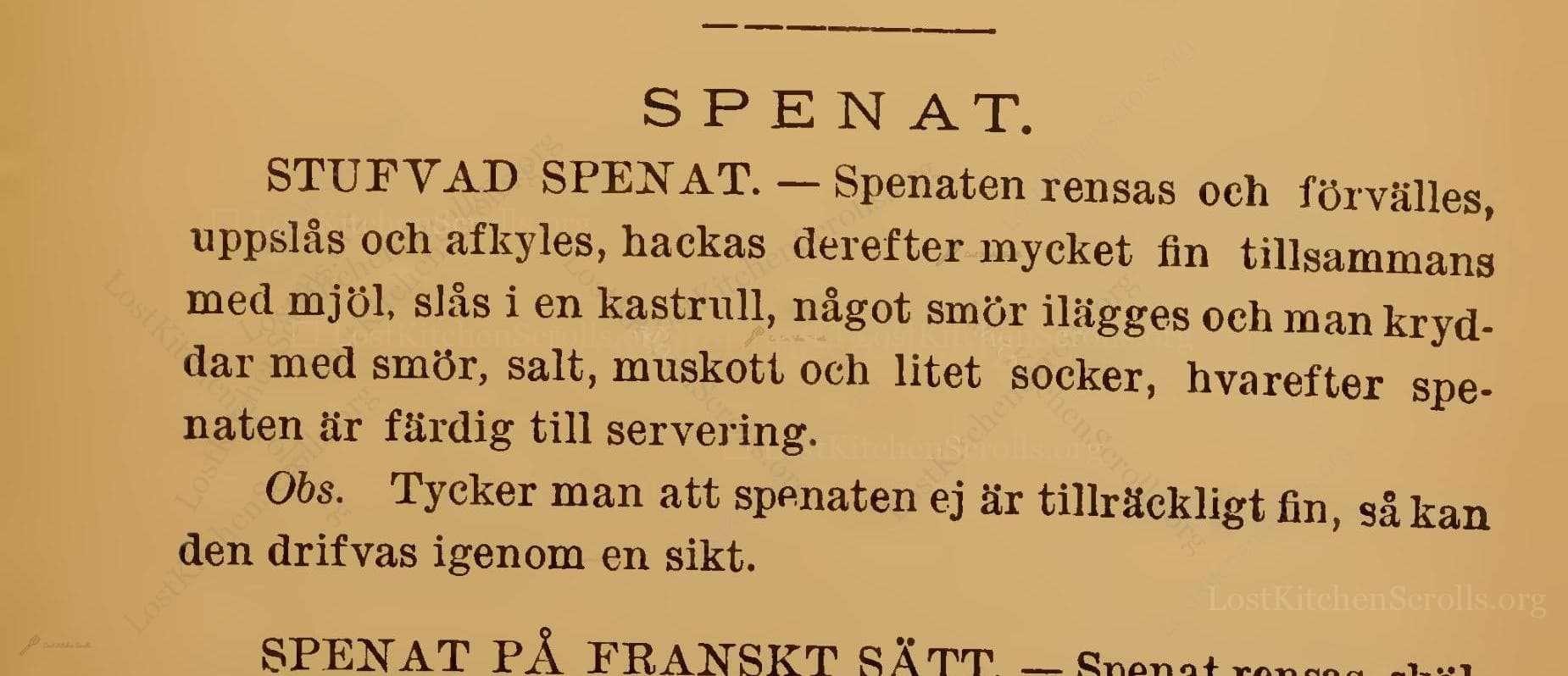Stufvad Spenat
"Stewed Spinach"
From the treasured pages of Praktisk, illustrerad kok-bok för Svenskarne i Amerika
Written by C. A. (Charles A.) Vallentin

Stufvad Spenat
"— Spenaten rensas och förvälles, uppslås och afkyles, hackas derefter mycket fin tillsammans med mjöl, slås i en kastrull, något smör ilägges och man kryddar med smör, salt, muskott och litet socker, hvarefter spenaten är färdig till servering. Obs. Tycker man att spenaten ej är tillräckligt fin, så kan den drifvas igenom en sikt."
English Translation
"— The spinach is cleaned and blanched, drained and cooled, then chopped very finely together with flour, placed in a saucepan, a bit of butter is added and it is seasoned with butter, salt, nutmeg, and a little sugar, after which the spinach is ready to serve. Note: If you think the spinach is not fine enough, you can pass it through a sieve."
Note on the Original Text
Recipes in this period were written with an expectation of the cook’s intuition and experience—quantities are vague, and instructions often brief. The spelling reflects older Swedish orthography ('stufvad' now 'stuvad', 'spenat' still in use). The phraseology—'uppslås och afkyles'—means beating up and cooling, not terms emphasized nowadays. There's also an assumption that cooks would know to adjust seasoning and texture to taste, hence the optional passage through a sieve for refinement. Period ingredients like nutmeg and sugar show a preference for delicate, warming flavors in otherwise simple vegetable dishes.

Title
Praktisk, illustrerad kok-bok för Svenskarne i Amerika (1889)
You can also click the book image above to peruse the original tome
Writer
C. A. (Charles A.) Vallentin
Era
1889
Publisher
Svenska bok-och musikhandelns förlag
Background
A practical and charmingly illustrated Swedish cookbook tailored for immigrants in America, this 1889 volume serves up a delightful array of recipes and culinary wisdom, blending Old World tradition with New World ingredients.
Kindly made available by
Library of Congress
This recipe hails from 'Praktisk, illustrerad kok-bok för Svenskarne i Amerika', published in Minneapolis in 1889, intended as a culinary guide for Swedish emigrants in America. The book provided recipes familiar to Swedish palates, adapted to the ingredients of the New World. This particular dish, 'Stufvad spenat' or creamed spinach, reflects both everyday Swedish cooking of the time and the desire for comforting, familiar fare in a new land. In an era when fresh produce was not always readily available, especially in winter, recipes such as this offered guidance on making the most of whatever greens could be found, often preserved or harvested from kitchen gardens. It’s a snapshot of practical, resourceful cooking.

Cooks in the late 19th century would have used a simple, heavy-bottomed saucepan (kastrull) over a wood- or coal-fired stove. A sharp knife and chopping board for the spinach, and perhaps a mortar or wooden pestle for pounding. Spoons (often wooden) for stirring, and a fine metal sieve (sikt) to strain the spinach if an especially smooth texture was desired. Blanching would be done in large pots of boiling water, cooled with cold water drawn from a well or pump.
Prep Time
10 mins
Cook Time
10 mins
Servings
4
We've done our best to adapt this historical recipe for modern kitchens, but some details may still need refinement. We warmly welcome feedback from fellow cooks and culinary historians — your insights support the entire community!
Ingredients
- 18 oz fresh spinach (or equivalent frozen if necessary)
- 1 tablespoon (0.35 oz) plain flour
- 1 oz butter (plus extra for seasoning)
- 1/2 teaspoon salt
- Generous pinch ground nutmeg
- 1/2 teaspoon sugar
Instructions
- Begin by washing and trimming approximately 18 ounces of fresh spinach, removing any tough stems.
- Blanch the spinach briefly in boiling water for about 1-2 minutes until wilted, then plunge it into cold water to halt the cooking.
- Drain thoroughly and squeeze out excess moisture.
- Finely chop the spinach together with 1 tablespoon (about 0.35 ounces) of plain flour.
- Transfer this mixture to a saucepan, add 1 ounce of butter, and season with a little more butter, 1/2 teaspoon of salt, a generous pinch of freshly grated nutmeg, and 1/2 teaspoon of sugar.
- Stir over low heat until the spinach is heated through, creamy, and fragrant.
- For an ultra-smooth texture, press the finished spinach through a sieve before serving.
Estimated Calories
110 per serving
Cooking Estimates
You will need about 10 minutes to wash, trim, and chop the spinach. Cooking takes about 10 minutes more, including blanching and heating everything together. Each serving has around 110 calories. This recipe makes 4 servings.
As noted above, we have made our best effort to translate and adapt this historical recipe for modern kitchens, taking into account ingredients nowadays, cooking techniques, measurements, and so on. However, historical recipes often contain assumptions that require interpretation.
We'd love for anyone to help improve these adaptations. Community contributions are highly welcome. If you have suggestions, corrections, or cooking tips based on your experience with this recipe, please share them below.
Join the Discussion
Rate This Recipe
Dietary Preference
Main Ingredients
Occasions

Den Bockfisch In Einer Fleisch Suppen Zu Kochen
This recipe hails from a German manuscript cookbook compiled in 1696, a time whe...

Die Grieß Nudlen Zumachen
This recipe comes from a rather mysterious manuscript cookbook, penned anonymous...

Ein Boudain
This recipe comes from an anonymous German-language manuscript cookbook from 169...

Ein Gesaltzen Citroni
This recipe, dating from 1696, comes from an extensive anonymous German cookbook...
Browse our complete collection of time-honored recipes



